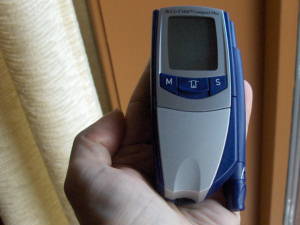Tuesday 11 October 2005

|
Pic of the day: Accu-Chek Compact Plus (I assume someone had already trademarked Accu-Check) blood glucose measurement kit, trendily camouflaged as mobile phone. Can measure glucose from a barely visible drop of blood. The pen-like thing on the right can draw that barely visible drop of blood quickly and virtually painlessly. Don't share needles. Blood sugarI bought a blood sugar measure kit at the apothecary (drugstore) for about the same as getting it tested once by the doctor. Of course if I keep using it, they will sell me needles and test strips at exorbitant prices, no doubt. And if I don't, the test strips only lasts something like 90 days. Still, it is good value for money in my situation. Both of my parents had diabetes, and the one who is still alive still has it, no doubt, albeit in a reasonably mild form. At least one grandparent had it as well, or at least he thought so. Of course, back then it had to be pretty far gone before people noticed. I believe that the family's genes predispose us for a somewhat higher blood sugar level, based on my theory that we burn more fat compared to carbohydrates than the average. This would result from thousands of years of animal husbandry on the mountaineous coast of Norway where sheep grow a lot easier than fruit or even grain. In support of this theory is the fact that we don't easily grow weak from hunger. As a kid I would literally only eat when I liked the taste of the food, and felt little or no hunger when I didn't. ***After much reading of the handbook (you'd think this should be idiot proof, given that many diabetics are old and weakened in eyes and sometimes in mind), I finally figured out how to do it. My fasting blood sugar was 5.5 mmol/l, or 85 mg/dl for my foreign readers. This is safely within the limits, but slightly above the middle. After returning from work, I had 7.3 mmol/l, or 115 mg/dl. At work I tend to eat a lot of carbs, several cups: Chocolate pudding, caramel pudding, chocolate milk, fruit yogurt, and an occasional wheat bun. But this is mostly early in the day, this measure was taken 3-4 hours after I stopped eating. Well, except for a honey lozenge, I'm not sure whether they actually contain noticeable amounts of sugar. If not, it is a bit on the high side for so long after eating. After 600 kcal of light exercise, blood sugar was down to 5.8 mmol/l, or 90 mg/dl. This is to be expected: Exercise will remove any excess glucose and bring the level down to fasting values. As soon as the level falls below this, the liver will release sugar from its glycogen reserves, which are pretty big (up to 10% of the liver mass). ***The tentative conclusion from these tests is that I may be in the borderland between normal and light insulin tolerance, but (as expected) far from actual diabetes yet. With the main known risk factor removed (upper body fat, well you still can't count my ribs but I'm definitely not apple-shaped by any stretch of the imagination) I don't expect the progress of tolerance to be fast, if at all. Some nutritionists, most notably the followers of Atkins, believe that age-related diabetes follows from accumulated exposure to high blood sugar levels. The idea is that each time there is a "sugar spike", the body releases insulin (which is certainly true) and that over time the body becomes less and less sensitive to these signals after experiencing them so often. To the best of my knowledge there is no proof of this theory. There is a statistical correlation between upper-body fat and insulin tolerance. Even this does not really say what is cause and what is effect: One of the effects of insulin is to give the OK to store fat and convert sugar into fat. (Humans really suck at transforming sugar to fat, actually, but we rule at using sugar instead of fat and squirreling away the real thing.) So lasting high levels of insulin could cause fat deposits or be a result of them. We do know however that lifestyle is a part of the problem, because this type of diabetes was far less common in the past, even among those who lived to the same age. It is also less common in parts of the world where obesity was rare until recently. But whether it is the fat or the sugar that causes it, is hard to say. I suppose I am going to be a test person for this if I live long enough. Since I can no longer eat more than small amounts of fat without getting sick, I have to rely on carbs for most of my energy. This has already caused me to lose weight to the point where I am outside the supposed risk zone, but my blood sugar levels may well be higher than before since I now eat lots of carbs. On the other hand, if I continue to do my hill walks and similar exercise regularly, my liver and muscles will probably continue to soak up sugar from the blood to restore their reserves. Besides, it is fun. But we shall have to see. None of us know what will happen tomorrow. Well, except that tomorrow is already over when I write this... |
Yesterday <-- This month --> Tomorrow?